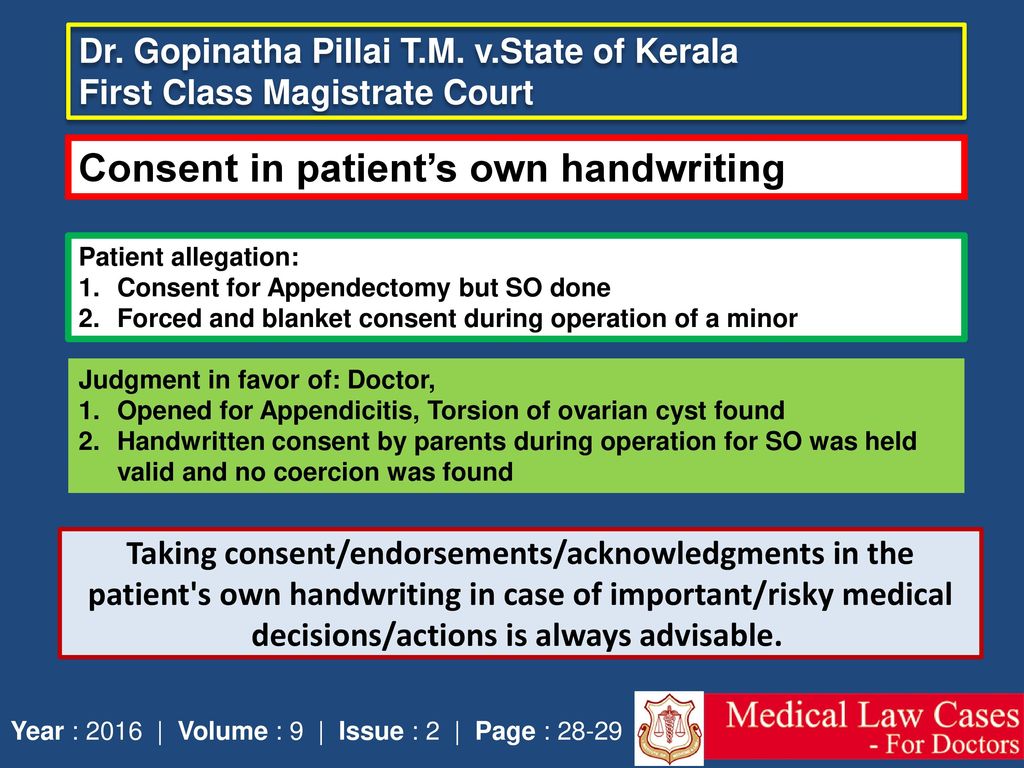
Capacity to consent requires that people have a mind capable of understanding the physical act, its sexual nature, the specific identity of their partner, as well as the choice of whether or not to engage in the sexual activity in question.
#JUDICIAL CONSENT SUMMARY TRIAL#
The majority also found that the trial judge made no mistake when he addressed the two questions together in his reasons.Ĭapacity is a precondition to being able to consent. In this case, the majority said the trial judge made no mistakes in finding the teenager was incapable of consenting and that she never agreed to the sexual activity. The majority stated that trial judges are not obliged to evaluate consent and capacity separately or in any particular order. They explained that consent to sexual activity requires someone to be capable of consenting before giving their consent. The majority of the judges said that consent and the capacity to give consent are inseparable.


The majority of the Supreme Court judges noted that this appeal gave the Court an opportunity to clarify the relationship between consent, and the capacity to give consent.Ĭonsent is the foundation of Canada’s sexual assault laws. The Crown appealed to the Supreme Court of Canada. As a result, the Court of Appeal concluded that a new trial was necessary for both G.F and R.B. The Court of Appeal also found that the trial judge failed to consider consent first and independently from the question of capacity to consent. However, the Court of Appeal said the trial judge should have explained the factors he considered when assessing if the teenager was too intoxicated to consent. The Court of Appeal agreed that based on the evidence, the verdict was reasonable. appealed the convictions to the Court of Appeal for Ontario. claimed that the 16-year-old had not been as intoxicated as she claimed, and that she had agreed to engage in the sexual activity. The Crown prosecutor argued that the teenager’s evidence clearly established incapacity due to intoxication and also that she had not agreed to the sexual activity. both testified and presented opposite versions of events. The issue at trial was whether the teenager who had consumed alcohol, had consented to sexual activity with the two adults. were charged with sexually assaulting a 16‑year‑old during a camping trip.

Supreme Court clarifies link between consent and capacity to consent in a sexual assault case. Trial (Ontario Superior Court of Justice) (unreported).On appeal from the Court of Appeal for Ontario.

Dissenting: Justice Suzanne Côté said the trial judge provided insufficient reasons and made an error in convicting the accused on the basis of the complainant’s incapacity without explaining both the standard used to decide on the incapacity to consent and its application to the complainant’s evidence.Concurring: Justice Russell Brown and Justice Malcolm Rowe said the trial judge did not provide sufficient reasons on the issue of the complainant’s capacity to consent, but the convictions should nevertheless be restored because there was overwhelming evidence that the complainant did not consent.Majority: Justice Andromache Karakatsanis allowed the Crown’s appeal and restored the convictions (Chief Justice Wagner and Justices Abella, Moldaver, Martin and Kasirer agreed).


 0 kommentar(er)
0 kommentar(er)
